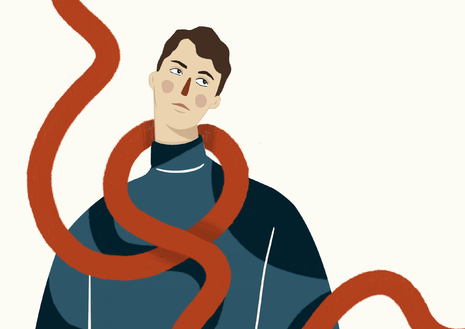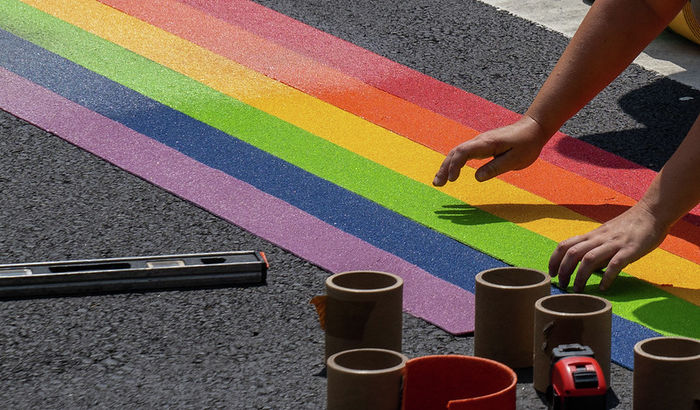Confronting HIV
After a scare, Owen Robinson sets out to learn more about the virus, and the activists and artists who have fought the deadly stigma that surrounds it

HIV used to be a concept that I never wanted to know or hear about. Despite the obvious obligation to be aware of it, especially as a gay man, I largely refused to comprehend its existence beyond a basic level. I simply made sure that a condom was used during sex, and left it at that. Job done.
My ignorance collapsed after I had unprotected sex with a seropositive man, while on my year abroad. From then on, the issue was suddenly unavoidable. I remember receiving the text message from the guy after I arrived back home, simply confused. Finally forced to meet a virus that I had acknowledged only enough to make sure I never had to confront it, the experience was distressing.
48 hours of trying to access healthcare in a foreign country, in broken French that couldn’t express the chaos of my mind. I was eventually prescribed post-exposure prophylaxis (PEP), which can prevent infection after the virus has entered a person’s body. I hadn’t even been aware that HIV could be prevented after sexual intercourse.
“Looking back, I was ashamed that I knew so little about the history of HIV/AIDS, or the queer community more generally”
One tablet every twelve hours, for a month. Imperative, or the whole treatment comes crashing down. One day, I stood in confusion, unable to remember whether I had taken that morning’s dose or not. The experience was made all the scarier given its coincidence with the initial panic surrounding coronavirus. Disease and contagion were at the forefront of everyone’s mind. Completely alone in my apartment during the strict Paris lockdown, I didn’t know whether my fever, rash and puking were symptoms of the flu-like illness that follows HIV infection, symptoms of coronavirus, or simply side-effects of the medication itself. I never found out what caused the symptoms.
For months after, I didn’t want to get a test. Upon watching the poignant French film 120 battements par minute, about HIV activists during the 90s, I ordered one. It was almost impossible not to ruminate on the huge sacrifices that these activists had made, so that all the sufferers of this disease could gain treatment or simply just dignity. I tested negative.
Looking back, I was ashamed that I knew so little about the history of HIV/AIDS, or the queer community more generally. I promised myself to learn more. I discovered that 32.7 million people have died from AIDS worldwide since the pandemic began in the early 80s. Despite falling rates in the West, 4,139 people were diagnosed with HIV in the UK in 2019. While the majority of those diagnosed with HIV in the West now go on to live full lives, 428 people died in the UK in 2017. Elsewhere, the situation is far worse. Around 1.1 million people in sub-Saharan Africa were diagnosed with HIV in 2018 alone. Due to lack of accessible (read: affordable) drugs, which happen to be legally owned by Western pharmaceutical companies, a large proportion of these people do not even receive treatment. To make matters worse, the Catholic Church still opposes condom use, this issue labelled “too small, partial” by Pope Francis.
And though statistics are important, they also miss the real, personal experiences of those who died or live with HIV/AIDS. Millions of individuals have been denied not just a normal life, but a voice.
“People our age are stunned to learn of the continued negligence of governments, pharmaceutical companies, and the Church”
The whole experience of HIV/AIDS is so shut off from our generation, both queer and otherwise. As young people, we luckily never had to experience that period of hysteria and suffering. Meanwhile, these issues are rarely discussed at school, or in wider society. People our age are stunned to learn of the continued negligence of governments, pharmaceutical companies, and the Church. Headlines such as “I’d shoot my son if he had AIDS, says vicar” (marketed at the time as “another red hot Sun exclusive”) seem implausible nowadays, even for the Sun. As Olly Alexander, star of Channel 4’s It’s a Sin, states, “young people can’t believe it happened.”
This unbelievability may explain the critical and public acclaim for the series, and the sudden increase in public discourse surrounding the disease. The series, focused on a group of young queer people in 80s/90s London, provides an informative looking glass into AIDS. It is a beautiful but tragic glimpse into an era that seems so incomprehensible today.
However, the series is also a clear reminder of the extent to which AIDS remains a taboo, sidelined now almost as much as before. The series was originally rejected by both the BBC and ITV. Channel 4 then reduced the number of episodes from eight to five. Still, decades on, the stories of those who suffer from AIDS are not deemed worthy of attention. They are often the stories of queer, black, or drug-consuming people that society had already spurned long before the virus.
Having now written my dissertation on AIDS literature, this too is an important medium to learn about and begin to grasp the personal experiences of those who lived (and died) through AIDS. David Wojnarowicz’s touching memoir Close to the Knives captures the struggles and sorrow that come with the disease and with the loss of a community, while exposing the failures of those in power who fail(ed) to respond. Similarly, Guillaume Dustan’s Dans ma chambre provides a radical reassertion of gay sexuality in 90s Paris, proclaiming agency over a queer seropositive body that society sees as ‘diseased’ and ‘infectious’.
With a government that is so keen to push back against LGBTQ+ (and especially trans) rights, it is paramount that both queer individuals and wider society try to truly comprehend and remember these experiences in our community, while demanding greater action in areas of the world that continue to suffer so greatly.
 Interviews / You don’t need to peak at Cambridge, says Robin Harding31 December 2025
Interviews / You don’t need to peak at Cambridge, says Robin Harding31 December 2025 News / Unions protest handling of redundancies at Epidemiology Unit30 December 2025
News / Unions protest handling of redundancies at Epidemiology Unit30 December 2025 Comment / What happened to men at Cambridge?31 December 2025
Comment / What happened to men at Cambridge?31 December 2025 Features / ‘Treated like we’re incompetent’: ents officers on college micromanagement30 December 2025
Features / ‘Treated like we’re incompetent’: ents officers on college micromanagement30 December 2025 Theatre / We should be filming ADC productions31 December 2025
Theatre / We should be filming ADC productions31 December 2025








